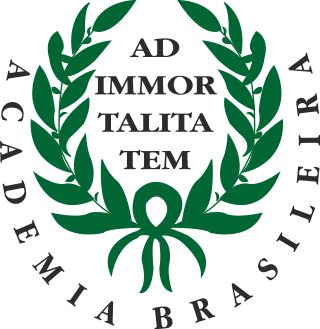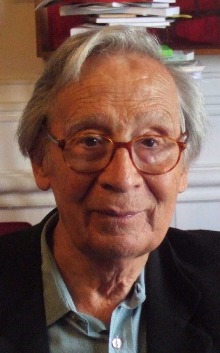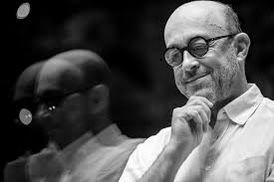Related Research Articles

Joaquim Maria Machado de Assis, often known by his surnames as Machado de Assis, Machado, or Bruxo do Cosme Velho, was a pioneer Brazilian novelist, poet, playwright and short story writer, widely regarded as the greatest writer of Brazilian literature. In 1897, he founded and became the first President of the Brazilian Academy of Letters. He was multilingual, having taught himself French, English, German and Greek later in life.

Fernando Ferreira Meirelles is a Brazilian film director, producer and screenwriter. He is best known for co-directing the film City of God, released in 2002 in Brazil and in 2003 in the U.S. by Miramax Films, which received international critical acclaim. For his work in the film, he was nominated for an Academy Award for Best Director. He was also nominated for a Golden Globe Award for Best Director in 2005 for The Constant Gardener, which garnered the Academy Award for Best Supporting Actress for Rachel Weisz. He also directed the 2008 adaptation of José Saramago's novel Blindness, and the 2011 film 360. In 2019 Meirelles directed and produced in Brazil the HBO original series Joint Venture and also directed The Two Popes for Netflix.

Brazilian literature is the literature written in the Portuguese language by Brazilians or in Brazil, including works written prior to the country's independence in 1822. Throughout its early years, literature from Brazil followed the literary trends of Portugal, gradually shifting to a different and authentic writing style in the course of the 19th and 20th centuries, in the search for truly Brazilian themes and use of Brazilian forms.

The Academia Brasileira de Letras (ABL) is a Brazilian literary non-profit society established at the end of the 19th century. The first president, Machado de Assis, declared its foundation on Tuesday, 15 December 1896, with the by-laws being passed on Thursday, 28 January 1897. On Tuesday, 20 July of the same year, the academy started its operation.
Antão Gonçalves was a 15th-century Portuguese explorer who was the first European to capture Africans in the Rio do Ouro region.

José Guilherme Merquior was a Brazilian diplomat, academic, writer, literary critic and philosopher.

Afrânio Coutinho was a Brazilian literary critic and essayist. He encouraged the rise of the "New Criticism" in Brazil of the 1950s. Coutinho edited the Portuguese version of Reader's Digest as well as several reference works on Brazilian literature. He also taught literature at several universities.

Rachel de Queiroz was a Brazilian author, translator and journalist.

Urbano Tavares Rodrigues, GCIH was a Portuguese professor of literature, a literary critic and a fiction writer, winner of many literary prizes.

Paulo Mendes Campos was a Brazilian writer and journalist.

Antonio Carlos Liberalli Bellotto is a Brazilian musician and writer, best known as the lead guitarist of Brazilian rock band Titãs. He has also written and released several books.
Alfredo Bosi was a Brazilian historian, literary critic, and professor. He was a member of the Academia Brasileira de Letras, occupying Chair number 12. One of his most famous books is História Concisa da Literatura Brasileira, widely used in Brazilian universities in literature courses. Bosi also wrote several studies about Italian literature and about major Brazilian writers, as well as essays on the field of hermeneutics.

Ricardo Artur de Araújo Pereira is a Portuguese comedian, political commentator and journalist. Pereira first rose to national notoriety in the early 2000s as a member of the Portuguese comedy group, Gato Fedorento.

Fernando Venâncio is a Portuguese born writer, intellectual, literary critic, linguist and academic. At present he holds Dutch nationality.
Companhia das Letras is the largest publishing house in São Paulo, Brazil. It was founded in 1986 by Luiz Schwarcz and his wife, Lilia Moritz Schwarcz.

Octavio Frias de Oliveira Filho, known as Otávio Frias Filho, was a Brazilian newspaper editor. He was Folha de S.Paulo's editorial director since 1984, as well as Grupo Folha's editorial director.

Boris Fausto was a Brazilian historian, political scientist and writer.

Alexandre Vidal Porto is a Brazilian writer and diplomat.

José Paulo Cavalcanti Filho is a Brazilian lawyer and writer. He graduated from the Recife Faculty of Law. He was secretary general of the Ministry of Justice and (interim) Minister of Justice, under former president José Sarney. He was also President of the Administrative Council for Economic Defense (CADE), of EBN and of the Social Communication Council. Consultant for UNESCO and the World Bank, he occupies chair 27 of the Pernambuco Academy of Letters. As a novelist, he has more than 18 titles written, some published abroad. He is also a deep connoisseur of the work of the Portuguese writer Fernando Pessoa. In 2012, he won the José Ermírio de Moraes award for his book Fernando Pessoa – a quasi-autobiography. It also won first place at the Book Biennial and the Jabuti Prize. He is the winner of the II Molinello Prize, in Italy. He also received awards in countries such as Romania, Israel, Spain, France, Holland, Germany, Russia, England and the United States.
Percival Oliveira Puggina is a Brazilian politician, architect, writer and journalist.
References
- ↑ "Revista PJ:Br - Jornalismo Brasileiro". www2.eca.usp.br. Retrieved 2016-04-27.
- ↑ Nascimento, Luciana Marino do (2014-07-18). Tempo de Ensaio (2): múltiplos olhares sobre o literário ensaios de graduandos em letras (in Portuguese). Letra Capital Editora LTDA. ISBN 9788577852727.